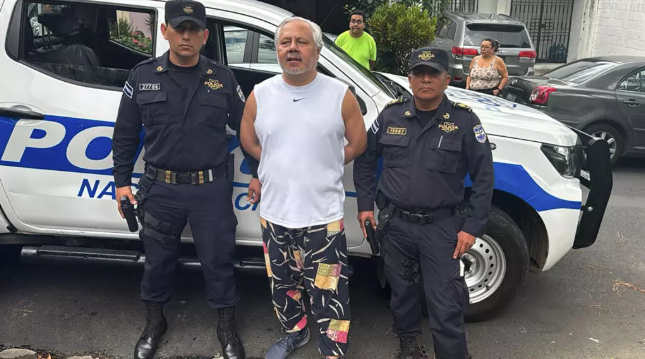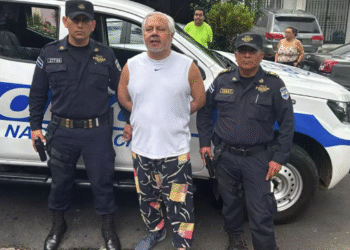Authorities arrested Salvadoran lawyer Enrique Anaya on Saturday, accusing him of money laundering—a move human rights groups see as part of a broader effort to silence government critics.
Photos shared by El Salvador’s Attorney General’s Office on social media showed Anaya in handcuffs as police arrested him in Santa Tecla, west of San Salvador. The constitutional lawyer, who has frequently denounced President Nayib Bukele and labeled him a “dictator,” faces charges of laundering money and assets and will soon be brought before the courts.
Anaya’s arrest comes on the heels of a similar case earlier this year involving lawyer Ruth Lopez, head of the anti-corruption unit at human rights organization Cristosal. She was accused of embezzling funds tied to her former role with an electoral court a decade ago.
Despite constitutional limits on consecutive presidential terms, Bukele secured reelection in February 2024, backed by a Supreme Court stacked with his allies.
“Of course I’m afraid”
While Bukele remains one of the world’s most popular leaders—largely due to his aggressive crackdown on gangs—critics warn of eroding civil rights and growing authoritarianism.
Bukele has brushed off accusations, saying, “I don’t care if they call me a dictator. I’d rather be called a dictator than see Salvadorans killed in the streets,” during a Sunday speech.
On Tuesday, Anaya responded on a television program, saying Bukele had “removed the mask” and shown his true self.
“Here, whoever speaks, whoever criticizes, whoever does not kneel before the idol, gets imprisoned. Of course, I am afraid,” he said.
In a final post on X the day before his arrest, Anaya warned that “the Bukelean dictatorship is increasingly questioned and confronted internationally,” citing the Inter-American Commission on Human Rights’ condemnation of Lopez’s and other activists’ detentions.
Cristosal, which Lopez leads, supports families affected by Bukele’s mass gang arrests and has also assisted more than 250 Venezuelans deported by the Trump administration and held in Salvadoran facilities funded by U.S. money.
“It’s part of what we’re living through. Unfortunately, Enrique’s situation is similar to Ruth’s case,” said Jaime Quintanilla, Anaya’s defense lawyer.
A Widening Crackdown
Cristosal called Anaya “a key figure in defending democratic institutions and constitutional order” and condemned his arrest as “a troubling escalation of criminalization against those who defend the rule of law in El Salvador.”
In recent months, authorities have arrested an environmental lawyer and an evangelical pastor backing a farmers’ protest. In February, human rights advocate Fidel Zavala faced accusations of gang involvement.
Bukele’s government also enacted a controversial Foreign Agents Law last month, requiring organizations with foreign funding to register and pay a 30% tax.
The European Union criticized the law, saying it “could restrict society,” and condemned recent arrests. Bukele shot back on X, calling the EU an “aged bloc” of bureaucrats that insists on “preaching to the rest of the world.”
Bukele continues to accuse NGOs of shielding criminals and claims the media is part of an “organized attack” orchestrated by global interests.
Anaya has repeatedly stated in interviews that Bukele’s legacy will be defined by “human rights violations” and the “destruction of democracy.”







